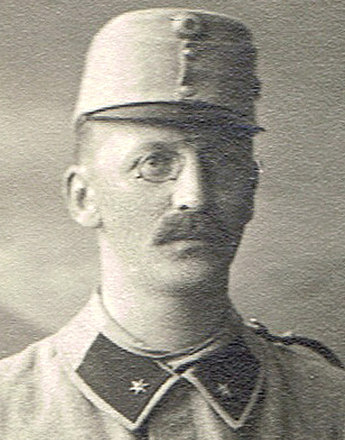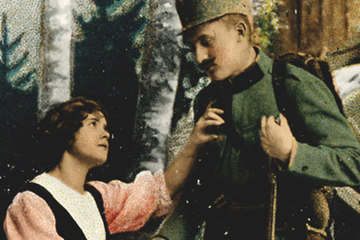As the war went on, the food supply situation in the Austrian half of the Monarchy began to assume catastrophic dimensions, particularly in the larger cities. The relevant authorities attempted to secure supplies by introducing measures such as rationing or ‘meat-free days’, but this did little to relieve the dismal situation during the latter years of the war. Black marketeering and profiteering increasingly led to widespread resentment among the population and an atmosphere of general mistrust.
In a letter to her husband dated 8 January 1918 Mathilde Hanzel speaks of a ‘civil war in the hinterland’, describing the prohibitive prices, shortages and illicit trading that characterized the supply situation in Vienna: ‘Now profiteering is everywhere, flour is 12-17 K [crowns], sugar 6 K, fat 24-32 K, in short it is shameful, and it is high time that the war stopped, otherwise ever more articles will fall victim to illicit trading and most people will be forced to starve.’
For Mathilde Hanzel, as for the majority of women in the First World War, the absence of her husband meant that she had to bear the sole responsibility for the care and feeding of her children and others in the family. In order to feed her two children with an adequate diet she attempted – like broad sectors of the Viennese population – to obtain food and non-consumable goods by other ways and means. These survival strategies arising from necessity ranged from the growing of vegetables or acceptance of support from other members of the family and friends to foraging trips into the countryside surrounding Vienna. Mathilde Hanzel writes for example in autumn 1917: ‘For the winter I want to buy in white turnips and carrots as well as apples. We’re starting to hoard turnips even now; it’s quite incredible the things one ends up doing in this war.’
The hordes of people swarming out from the towns into the countryside with rucksacks on their backs represented a mass phenomenon that grew as the war dragged on. As the supply situation was better in many rural areas compared to the towns, farmers were confronted „with a veritable stampede“ of city folk scouring the countryside for food. Official attempts were made to try and stop these ‘hoarding trips’, with checks made on passengers’ rucksacks at railway stations, when any goods found were immediately confiscated. However, this was not very efficient and alienated the Viennese population, who had little tolerance for such measures.
Translation: Sophie Kidd
Breiter, Marion: Hinter der Front. Zum Leben der Zivilbevölkerung im Wien des Ersten Weltkrieges, Unveröffentlichte Dissertation, Universität Wien 1991
Hautmann, Hans: Hunger ist ein schlechter Koch. Die Ernährungslage der österreichischen Arbeiter im Ersten Weltkrieg, in: Botz, Gerhard/Hautmann, Hans (Hrsg.): Bewegung und Klasse. Studien zur österreichischen Arbeitergeschichte, Wien/München/Zürich 1978, 661-682
Healy, Maureen: Vienna and the Fall of the Habsburg Empire. Total War and Everyday Life in World War I, 2. Auflage, Cambridge/New York 2006
Rebhan-Glück, Ines: „Wenn wir nur glücklich wieder beisammen wären …“ Der Krieg, der Frieden und die Liebe am Beispiel der Feldpostkorrespondenz von Mathilde und Ottokar Hanzel (1917/18), Unveröffentlichte Diplomarbeit, Wien 2010
Quotes:
„civil war in the hinterland“ : Mathilde Hanzel to Ottokar Hanzel, 08.01.1918, Sammlung Frauennachlässe, Nachlass 1, Institut für Geschichte der Universität Wien (Translation: Sophie Kidd)
„Now profiteering is everywhere ...“: Mathilde Hanzel to Ottokar Hanzel, 08.01.1918, Sammlung Frauennachlässe, Nachlass 1, Institut für Geschichte der Universität Wien (Translation: Sophie Kidd)
„For the winter I want to buy ...“: Mathilde Hanzel to Ottokar Hanzel, n. d., Sammlung Frauennachlässe, Nachlass 1, Institut für Geschichte der Universität Wien (Translation: Sophie Kidd)
„farmers were confronted with a veritable stampede“: Breiter Marion, Hinter der Front. Zum Leben der Zivilbevölkerung im Wien des Ersten Weltkrieges. Unveröffentlichte Dissertation, Universität Wien 1991, 77
„Official attempts were made to try to stop …“: Healy, Maureen: Vienna and the Fall of the Habsburg Empire. Total War and Everyday Life in World War I, 2. Auflage, Cambridge/New York 2006, 55
-
Chapters
- How does a collection of letters come to be stored in an archive?
- The protagonists: Mathilde Hübner and Ottokar Hanzel
- Love, marriage, career
- The separation begins
- ‘War fever’ versus the longing for peace
- Italy’s ‘betrayal’ in 1915
- ‘… surely this war must end some time?!’
- ‘… and tomorrow we will start cheerily canvassing for peace.’
- Black marketeering, profiteering and self-subsistence
- A love affair in wartime















